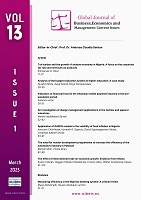Application of GARCH models in the volatility of food inflation in Nigeria
Application of GARCH models in the volatility of food inflation in Nigeria
Author(s): Innocent Chile Nzeh, Hycenth Oguejiofoalu Richard Ogwuru, David Ogomegbunam Okolie Okolie, Jonathan Ibekwe OkolieSubject(s): National Economy, Evaluation research, Family and social welfare, Financial Markets, Public Finances, Human Resources in Economy, Business Ethics, Socio-Economic Research
Published by: Birlesik Dunya Yenilik Arastirma ve Yayincilik Merkezi
Keywords: Asymmetric models; GARCH models; inflation; volatility;
Summary/Abstract: This paper aimed to investigate the behavior of the current food inflation volatility arising from the recent past behavior and to know if this volatility is persistent over time in Nigeria. The study covered the period from 2003M1 to 2021M9 under both the asymmetric and the symmetric GARCH models. The findings of the study revealed that one period lag of food inflation had a positive and significant impact on the current value of food inflation. Furthermore, it was found that in all the selected models, volatility in food inflation is persistent and bad news had an impact on food volatility in two of the models, while good news had an impact in one model. However, the asymmetric coefficient in all the asymmetric models is not significant. Consequently, the study contends that policymakers should factor in the impact of recent past values of inflation when framing policies meant to tame food inflation in Nigeria.
Journal: Global Journal of Business, Economics and Management: Current Issues
- Issue Year: 13/2023
- Issue No: 1
- Page Range: 63-81
- Page Count: 19
- Language: English

